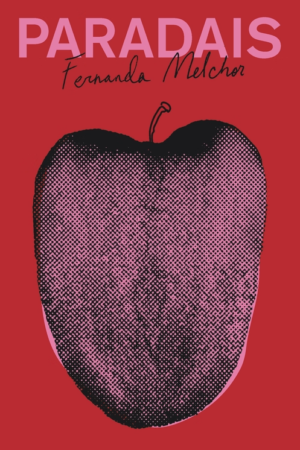Paradais
by Fernanda Melchor, translated by Sophie Hughes
reviewed by Gabriella Martin
Paradise is a wealthy, gated housing development in Mexico. Inside Paradise are two teenage boys, unlikely companions brought together by desperation and loneliness, binge-drinking by the river night after night. One of them, Franco, a.k.a. “fatboy,” is addicted to porn, looks like an “overfed cherub,” and lives with his rich grandparents in the development. The other, Polo, has dropped out of high school and works at Paradise as a gardener to make ends meet. He reluctantly befriends Franco, whose access to booze offers him an escape from his home life, where, according to him, he can’t catch a break from his mother and his pregnant “slut of a cousin.”
Exhibiting all the qualities of a classic “incel,” Franco is obsessed with his neighbor, Señora Marián, mother to two boys and wife of a well-known television personality; he masturbates to her obsessively, filthy fingers coasted in a film of cheese dust. This obsession, however, escalates drastically. When Franco hatches a violent, chilling plan, Polo goes along with it, (supposedly) thinking it’s just talk: “That’s why Polo played along, that’s why he nodded away to everything that fatty said, as insane, as preposterous as it was; how the fuck was he supposed to know what the crazy prick would be capable of doing in order to bone that bitch. Who could have known he really meant what he said?” From the very first page, we are warned that we are speeding toward something horrific.
Paradais is Fernanda Melchor’s second novel translated into English, following Hurricane Season (published in 2020, also in Sophie Hughes’s translation). Both novels were nominated for the International Booker Prize. Those familiar with Hurricane Season will recognize Melchor’s voice and style (or rather, Hughes’s rendering of them) at once: rich and winding sentences woven through breathless page-long paragraphs; filthy, slang-ridden spoken language; a cinematic gaze that doesn’t shy away from extreme violence, rape, disenfranchisement, or social inequality; haunted houses and men who fear the women who live inside them (as they ultimately fear most women).
But Paradais departs from Hurricane Season in several significant ways: it is a much slimmer novel at just over one hundred pages, and is far more compact and focused in scope than its predecessor. It is worth noting that Paradais also nods to a classic of twentieth-century Mexican literature, Jose Emilio Pacheco’s 1981 novella Battles in the Desert, which is cited in Paradais’s epigraph and also includes a plotline involving teenage MILF lust. In this sense, Melchor situates Paradais specifically within a canon of Mexican literature, dialoguing with previous explorations of class, cruelty, and desire.
While the novel can be read in one sitting, it is not easy to take it all in at once, to stare (sexual) violence directly, intensely, helplessly in the face. The reader watches the events unfold solely through Polo’s point of view, as he attempts to rationalize his behavior and navigate his complicity in various events. We aren’t allowed to look away from the horror he sees. It’s a bold narrative move, and Melchor goes there, unafraid to analyze misogyny at its source and pull the reader with her—to look through the lens of, rather than at, toxic masculinity.
To Franco and Polo, women are, after all, just holes to be filled, and usually not even worth the trouble. Polo muses about Señora Marián (in a classic example of the Melchorian voice and lexicon that Hughes so attentively adapts): “as if a rotten swamp of a cunt justified all that effort, all that energy, the carnage that was to come, their lives devastated, everything gone for a second-rate fucking snatch: a grubby, slimy, murky hole.” Behind Franco’s desire for Señora Marián (and his resentment that she won’t fuck him)—and Polo’s wrath toward her as a desirable subject—lie anger, fear, and a downright hatred of women, which is a generational and, more broadly, societal inheritance. According to Polo’s grandfather, “it was bad for a man’s health—‘pernicious,’ he would say—to sleep so close to a woman; everyone knew that the female humors debilitate, dull the mind.”
But toxic masculinity as manifested in relation to sex and desire is only one side of Paradais. Outside of Paradise lies the pointedly named town of Progreso, where Polo lives and where his older cousin has gotten wrapped up with “them,” the narcos. This backdrop does not justify Polo’s decisions and perspective, born out of poverty and a lack of social mobility, but it does give them context. He has nothing to lose.
Importantly, the violent, horrific event on which the novel hinges takes place in the heart of Paradise, perpetrated by one its own wealthy, white residents, in turn subverting popular tropes and representations of where and how violence is enacted. Melchor makes evident how violence and misogyny touch all corners of society, even the communities thought to be protected by physical gates, security guards, and money. Of course, it happens even in Paradise.
Published on July 26, 2022

